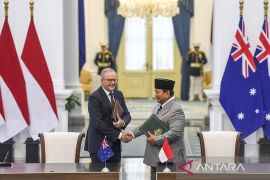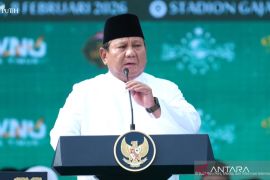The central bank`s governor, Darmin Nasution, said here on Wednesday the Indonesia Balance of Payment (NPI) in 2011 was predicted to record a relatively big surplus although it would be lower than in 2010.
"Exports would still grow high but import growth would be higher in line with increasing domestic demand to make the surplus in the current account lower. On the other hand, the financial and capital current account is predicted to still record a high surplus, driven by huge inflow of funds in the form of portfolios or direct investment," he said.
He said the global economic recovery momentum was still overshadowed by debt crisis risks in Europe. However despite the still weak economic recovery in the advanced countries the economic performance of the emerging markets continued showing an improvement.
Global commodity prices meanwhile continued to rise not only because of a supply-demand factor but also because investment had moved to commodity markets due to the weakening of the US dollar and low yields in the advanced countries.
So far central banks in the advance countries still tend to keep their interest rates relatively low while some emerging markets have increased the rate accompanied by policies for managing capital inflows and stabilizing dollar movement.
In the backdrop of the still uncertain global economic and financial conditions the board of governors of Bank Indonesia still believed the country`s economy could grow 6.0 percent in 2010.
The achievement was boosted by economic growth in the fourth quarter of 2010 which was predicted to reach 6.1 percent or higher than in the previous quarter.
The growth is driven by strong domestic demand especially household consumption and investment. The country`s economic progress is also boosted by quite solid external performance.
For the whole 2010 the NPI would still record a quite big surplus due to continuing strong capital inflows especially direct investment and portfolio.
"The foreign currency reserves until the end of December 2010 were recorded at US$96.2 billion or equal to 7.1 months of imports and payments of government foreign debts," he said.
In line with the country`s strong external economic performance the rupiah exchange rate is appreciating with a quite low degree of volatility. Point-to-point the rupiah rose 4.4 percent year-to-date to Rp9,100 per US dollar with lower volatility.
To manage capital inflows and stabilize the rupiah exchange rate Bank Indonesia has intervened in foreign currency trading and accumulated foreign exchange reserves to boost positive expectation towards the domestic economy.
Relatively the rupiah appreciation has been lower than the appreciation of other currencies in the region and therefore the country`s competitive power remains quite competitive, he said. (*)
Editor: Heru Purwanto
Copyright © ANTARA 2011











